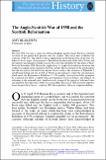The Anglo-Scottish war of 1558 and the Scottish Reformation
Abstract
The year 1558 was one of open war between England and Scotland. Previous scholarly accounts of this period have glossed over this conflict. This article first establishes the contours of the war. The failure of peace negotiations in the first portion of the year was linked to Scots’ hopes of an invasion of Berwick in the aftermath of the fall of Calais, and the tentative movements towards peace in October were disturbed by the death of Mary Tudor in November 1558. Beyond its implications for Anglo‐Scots relations, however, this conflict was significant in a domestic Scottish context. The second part of the article argues that the war interacted with better‐known factors such as the accession of Elizabeth I, anti‐French feeling and the growth of Protestant preaching to create the circumstances which made the Reformation Rebellion of 1559 possible. Increased mobility prompted by a national war effort, coupled with a governmental focus on defence, and reliance on reformers in the national army, simultaneously promoted the spread of reformed ideas and inhibited the authorities’ ability to contain them. The war of 1558 therefore helped to foster the growth of ‘heresy’, which in 1559 blossomed into full‐scale religious rebellion.
Citation
Blakeway , A L 2017 , ' The Anglo-Scottish war of 1558 and the Scottish Reformation ' , History: The Journal of the Historical Association , vol. 102 , no. 350 , pp. 201-224 . https://doi.org/10.1111/1468-229X.12373
Publication
History: The Journal of the Historical Association
Status
Peer reviewed
ISSN
1468-229XType
Journal article
Rights
© 2017 The Author. History © 2017 The Historical Association and John Wiley & Sons Ltd. This is an open access article under the terms of the Creative Commons Attribution‐NonCommercial‐NoDerivs License, which permits use and distribution in any medium, provided the original work is properly cited, the use is non‐commercial and no modifications or adaptations are made.
Collections
Items in the St Andrews Research Repository are protected by copyright, with all rights reserved, unless otherwise indicated.

